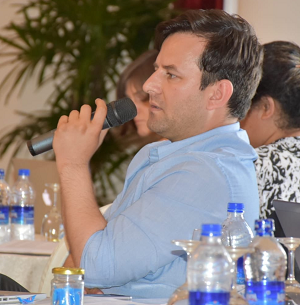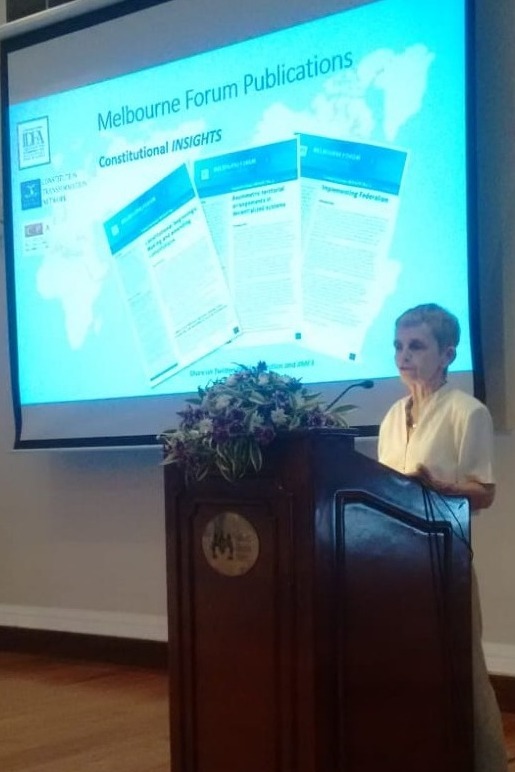Introduction
Report from the Third Melbourne Forum on Constitution Building in Asia and the Pacific
Organised by the Constitution Transformation Network, International IDEA and Centre for Policy Alternatives
Colombo, Sri Lanka, 15-16 October 2018

In 2018, the Third Melbourne Forum on Constitution Building in Asia and the Pacific brought together scholars and practitioners from across the region to explore the implications of culture for the making and implementation of constitutional change, in processes collectively conceived as ‘constitution building'.
Culture affects constitutional arrangements in all parts of the world. Melbourne Forum 2018 explored these issues with primary reference to the countries of Asia and the Pacific, as a vast and diverse region of the world that represents a substantial component of global constitutional experience. The Asia‐Pacific region offers a particularly useful context for the theme of this Forum. Asia and the Pacific are home to an extraordinary variety of cultures. In many cases, aspects of culture have deep historical roots; in at least some, culture is or has been implicated in conflict; everywhere, it is evolving. Constitution building has been a familiar phenomenon across the Asia‐Pacific in recent decades, interacting with aspects of culture, which the Forum was designed to explore.

The goals of the Forum were to explore the implications of culture for constitution building across Asia and the Pacific in order to:
- Better understand how culture affects the process and substance of constitution building generally and in transition to democracy in particular;
- Consider and compare experiences of how culture can enhance or impede democratic constitution building processes and outcomes;
- Explore how disagreements over culture within communities can affect constitution building; understand by whom and why cultural issues are raised; and identify options for resolving the resulting problems;
- Examine the challenges of culture for constitution building in multicultural states and identify options for dealing with them;
- Better understand the role of culture in the implementation of democratic constitutions, both generally and for the purposes of specific types of change (eg transition to a federal form of state or a secular state).
- Examine the implications of culture as a component of a constitution building context for informed and effective external assistance and advice.

Each of these goals has global significance. The insights gained from the Forum are useful, not only to assist understanding of constitution building in this important region, but also to inform global practice more generally.
The Melbourne Forum encourages dialogue between participants. To structure the dialogue, the principal questions for each session are clearly identified, in a way that supports the overall aims of the Forum itself. Each session begins with an examination of 3-4 case studies relevant to the questions asked. The panellists prepare written answers to the questions in advance, on the basis of which discussion can occur. In 2018, the Forum was structured around 5 substantive sessions, followed by one concluding session, to draw key issues together from different perspectives.

The session themes and cases studies were:
- Societal culture and constitutions: Tuvalu, Vietnam, Thailand
- Constitution building in culturally diverse states: India, Indonesia, Sri Lanka
- Implications of constitutional culture for constitution making: Philippines, Myanmar, Japan
- Constitutional culture in the context of implementation: Papua New Guinea, Bhutan, Maldives, Malaysia, Nepal
- External assistance and culture: Timor Leste, Afghanistan, United Nations
- Conclusions: CPA, International IDEA, ConTransNet
A series of policy papers will be published in due course, as part of the Constitutional INSIGHTS series, drawing on the deliberations of the Forum. The purpose of this Report is to make the case studies and some of the key insights publicly available as quickly as possible. The Report is organised by reference to the Forum sessions and comprises the responses of each of the participants to the questions asked. Some of the responses are still being finalised for publication in this form. They will be added progressively as soon as they are available.

launching MF-17 Constitutional INSIGHTS.
The success of the Forum was due to the knowledge, skills and commitment of all the panellists, chairs and support staff from all three institutions. Thanks are due to them all.
Panellists whose work appears, or will appear, in this Report are: Bui Ngoc Son (Vietnam), Eugénie Mérieau (Thailand), Eselealofa Apinelu (Tuvalu), Suhrith Parthasarathy (India),Denny Indrayana (Indonesia), Harini Amarasuriya (Sri Lanka), Akiko Ejima (Japan), Benny Bacani (Philippines), Ngun Cung Andrew Lian (Myanmar), Tenzin (Bhutan), Mariyam Zulfa (Maldives), Seira Tamang (Nepal), Stephen Pokawin (Papua New Guinea), Dian Abdul Hamed Shah (Malaysia), Aderito Soares (Timor Leste), Shamsad Pasarlay (Afghanistan), Rohan Edrisinha (UN-DPA), Dinesha Samararatne (Sri Lanka) and Sakuntala Kadirgamar-Rajasingham (Sri Lanka).
The achievements of the Forum lie not only in publications and an informed, frank exchange of views, as important as these are. The Forum also fosters a network of informed and knowledgeable people across the region who can derive benefit from continuing contact with each other and on whose expertise both International IDEA and ConTransNet can draw from time to time.